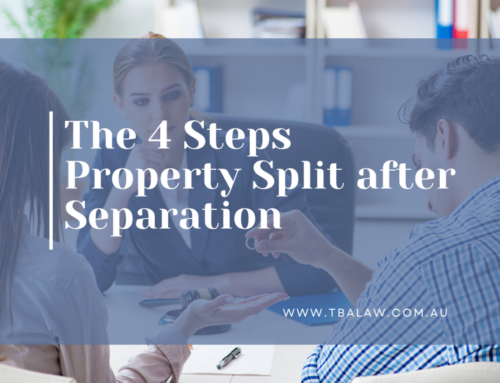3 Financial Mistakes People Make When Separating
by Karen Luk
Today I’m going to talk about three financial mistakes that we see people make when they go through separation.
The first mistake is that clients often assume their friend, or family member’s outcome will be the same as theirs, and this is something we see all too often.
We commonly see our clients coming to us and telling us that their friend or family member went through a divorce, and we’ve heard people say that they want their separation or divorce to be the same as theirs. We understand that going through separation and a divorce is often very challenging and there are many emotions involved–and it affects people for longer than just the separation period.
It’s hard to know what the future will look like when you’re going through a separation. There are many moving pieces and lots of uncertainty, so it’s important to lean on friends and family members who have been through a similar situation. But what we do want you to be aware of is not to rely solely on them for legal advice and not get legal advice from non-legal people. The way financial division is decided under the Family Law Act and what the court considers is different for every relationship, case, family situation: what were their pre-relationship assets?

If one of you has a business, or was entitled to a trust before the relationship started, that’s relevant too. What were the contributions during the relationship is another factor. So who was paying for more of the expenses during the relationship, but also non-financial, that’s valued just as much. And who looked after the children more and took care of home duties is the second factor.
The last one is what are the future needs of each party? So that takes into account any health conditions you have, your age, who’s going to be looking after the children more moving forward, whether either of you are expected to have a windfall, or a large sum of money of some kind, whether that’s due to a deceased estate, a win, or a compensation, or a payout from another court case, or something like that. That’s the third consideration in terms of swaying the needle each way for how much each party gets. So as you can see, there’s a lot of factors and it’s never replicated from one case to another. So although it’s good, as I was saying, to speak to your friends and family, for them to help you through this process and support your mental health, and have someone to talk to about the experiences you’re having, and the feelings that you’re going through, we just recommend that you don’t get legal advice from them.
The second mistake I wanted to talk about is that you’ve talked to a lot of people, but not with your ex-partner or a solicitor to consider the financial aspects of your situation.
At the time of separation, a lot of couples have a discussion about how they think their assets should be divided. It’s a good conversation to have because we’ve seen that it’s not always clear who should get what. A lot of clients have decided to actually get legal advice and formalize their separation by filing for divorce. They often had difficult times in the relationship because they realized that it wasn’t going to work out. So they might have a dinner table discussion about, “Well, I think we should do this,” or “What if you kept the house and just paid me out a certain amount every month?”
It is a good thing to have that discussion, especially if the parties are amicable. So you know where each other’s at, and as much as possible, can remain amicable and have that line of communication open during the separation process. That’s obviously the best case scenario, but we just want clients to be aware that they don’t make the mistake of having really rigid thinking and thinking that, “Well, I’ve came in to a solicitor’s office and I’ve told them I want this as my settlement. I’m not going to listen to any other advice. This is what I want. And we’ve decided on this.” We try to give advice, as a lawyer, it’s obligation to give you advice that tells you what your risks are with any step that you’re planning on taking. And a lot of the times we see that clients believe they’ll take on an asset after separation and it might be agreed.
So it might be that one party takes over the house, but they don’t consider what are the ongoing costs of maintaining that asset, whether they’re able to meet those costs. So it could be insurance, especially with interest rates rising. It could be, sorry, mortgage especially with interest rates rising and it could be paying for insurance, or maintenance of a house. It depends on that, that party’s own financial situation. Are they on Centrelink? Do they work casually? Is their job on a contract basis? So there’s no guarantee of future income. They’re all risks that are relevant to taking on especially a big asset like a property. And the other mistake that people don’t think about is also that when you are thinking of how to split up assets and one of you potentially wanting to delay the sale of something, and it could be for example, if you had a child who was in year 10 and you were thinking, “Well, we just want to create a stable environment for our son or daughter. So we’re just going to not sell it for two or three years until after they’ve finished year 12.”
Although that is desirable and that it creates stability, there’s also risks that your lawyer will be wanting to make sure that you are aware of and that we try to minimize when we do draft up that agreement. You should be prepared to have a financial relationship with your ex-partner for that period. So typically we try and draft settlements that sever, so they cut the financial relationship, because you are coming out of the relationship and you don’t want to have to have those emails, and calls, and text messages, from your ex-partner arguing about payment, or money, or whether we put up a fence, or fix the fence, chasing them if they haven’t paid you what that you agreed to. We’re trying to avoid the ongoing relationship or contact that you need and so that you both can move on and have financial independence and start the next chapter of your life.
And so just a word of warning that if you are planning on keeping an asset for a little while and still having that financial relationship, you should be prepared for the effect that might have on you. And that’s why we always try and encourage clients, it’s good that if you’ve got some notes written down about what you are hoping to come out of the separation with, but just also be open-minded and take on the advice that your solicitor may be giving you about the pros and cons of each option.
The third mistake to avoid is post-separation spending, disposing and acquiring assets.
The mistake that people make is that they believe that any assets, or money that’s in their own account, or you might have an account in your own name, or the house might only be in your name on the title, that that means you can deal with it however you want after separation, that the other party may have hurt you in a certain type of way and you just want to take what you believe is yours and protect yourself, and that is incorrect.
So even assets that are in your name and assets that are in joint names, assets that are in the other party’s names, they all fall into the joint asset pool and that’s what the negotiations and the settlement is trying to determine, how all of that lumped together is going to be carved up. So after separation, we don’t recommend and we caution people to not spend something that would be very different to what they were spending during the relationship.
So for example, taking out a lot of money to go on a holiday, significant withdrawals or transfers to a family, or friend, or to a new partner, buying expensive assets, luxury goods, buying a lot of it could be a new vehicle, or a gift to someone else. Just be mindful of that and selling any of the assets. And so any of the assets that you had. So for example, if you were going to list the property for sale, because you are the only one on title, it’s usually something that you’d have to inform your spouse about and the money from the sale is usually held in a trust account so that the parties can resolve and agree on how it’s going to be split before it’s released.
So we just recommend that you maintain the same spending and lifestyle that you have had before. Obviously there’s no concerns if you continue to pay for school fees, and groceries, and insurance, mortgage, things that it’s expected you’d need for your day-to-day life. But just be wary if you’re making any big financial purchases, or decisions, or getting rid of assets to discuss that with your solicitor, so you know what the consequences of that might be. And it could result in what we call an add-back where what you’ve taken away from the asset pool, or what you’ve received a personal gain from, it’s added back in nominally when the parties negotiate the percentage that each person gets.
If you are separating or who knows someone separating and want to know how to avoid financial mistakes, contact us on 1300 043 103 or admin@tbalaw.com.au.






Leave A Comment